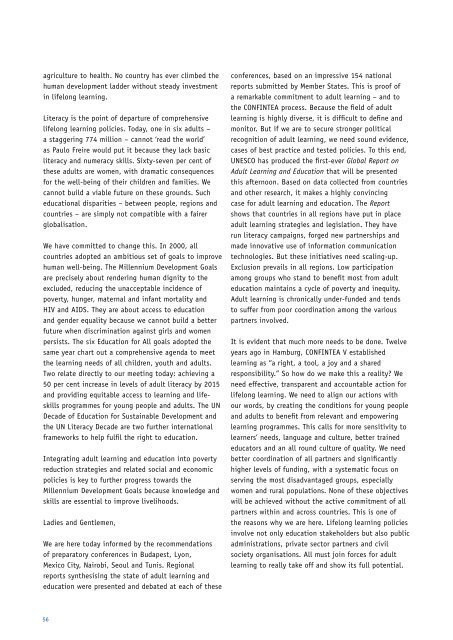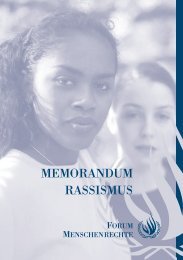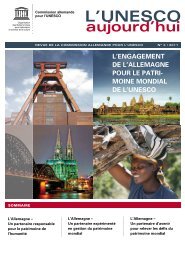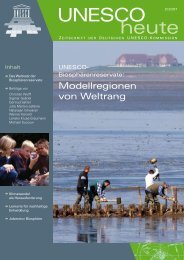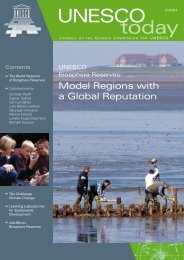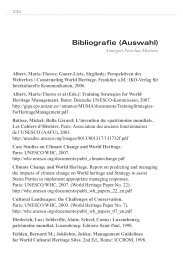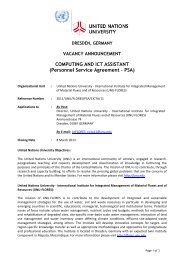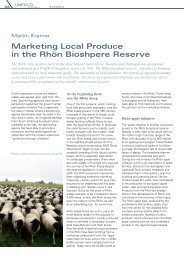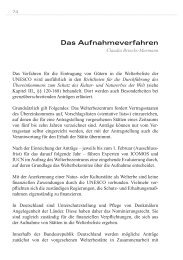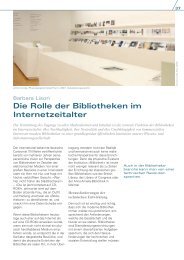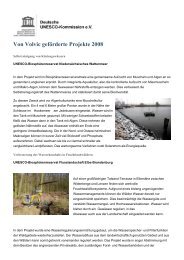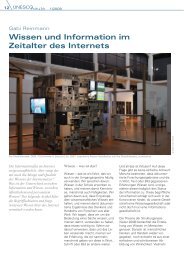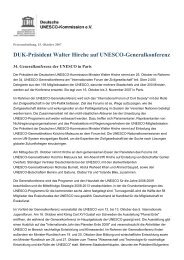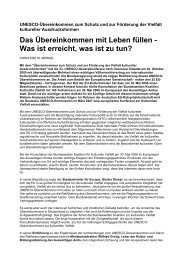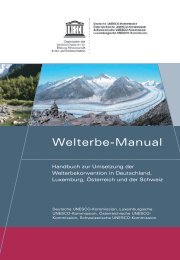CONFINTEA VI, final report - Unesco
CONFINTEA VI, final report - Unesco
CONFINTEA VI, final report - Unesco
You also want an ePaper? Increase the reach of your titles
YUMPU automatically turns print PDFs into web optimized ePapers that Google loves.
agriculture to health. No country has ever climbed the<br />
human development ladder without steady investment<br />
in lifelong learning.<br />
Literacy is the point of departure of comprehensive<br />
lifelong learning policies. Today, one in six adults –<br />
a staggering 774 million – cannot ‘read the world’<br />
as Paulo Freire would put it because they lack basic<br />
literacy and numeracy skills. Sixty-seven per cent of<br />
these adults are women, with dramatic consequences<br />
for the well-being of their children and families. We<br />
cannot build a viable future on these grounds. Such<br />
educational disparities – between people, regions and<br />
countries – are simply not compatible with a fairer<br />
globalisation.<br />
We have committed to change this. In 2000, all<br />
countries adopted an ambitious set of goals to improve<br />
human well-being. The Millennium Development Goals<br />
are precisely about rendering human dignity to the<br />
excluded, reducing the unacceptable incidence of<br />
poverty, hunger, maternal and infant mortality and<br />
HIV and AIDS. They are about access to education<br />
and gender equality because we cannot build a better<br />
future when discrimination against girls and women<br />
persists. The six Education for All goals adopted the<br />
same year chart out a comprehensive agenda to meet<br />
the learning needs of all children, youth and adults.<br />
Two relate directly to our meeting today: achieving a<br />
50 per cent increase in levels of adult literacy by 2015<br />
and providing equitable access to learning and lifeskills<br />
programmes for young people and adults. The UN<br />
Decade of Education for Sustainable Development and<br />
the UN Literacy Decade are two further international<br />
frameworks to help fulfil the right to education.<br />
Integrating adult learning and education into poverty<br />
reduction strategies and related social and economic<br />
policies is key to further progress towards the<br />
Millennium Development Goals because knowledge and<br />
skills are essential to improve livelihoods.<br />
Ladies and Gentlemen,<br />
We are here today informed by the recommendations<br />
of preparatory conferences in Budapest, Lyon,<br />
Mexico City, Nairobi, Seoul and Tunis. Regional<br />
<strong>report</strong>s synthesising the state of adult learning and<br />
education were presented and debated at each of these<br />
56<br />
conferences, based on an impressive 154 national<br />
<strong>report</strong>s submitted by Member States. This is proof of<br />
a remarkable commitment to adult learning – and to<br />
the <strong>CONFINTEA</strong> process. Because the field of adult<br />
learning is highly diverse, it is difficult to define and<br />
monitor. But if we are to secure stronger political<br />
recognition of adult learning, we need sound evidence,<br />
cases of best practice and tested policies. To this end,<br />
UNESCO has produced the first-ever Global Report on<br />
Adult Learning and Education that will be presented<br />
this afternoon. Based on data collected from countries<br />
and other research, it makes a highly convincing<br />
case for adult learning and education. The Report<br />
shows that countries in all regions have put in place<br />
adult learning strategies and legislation. They have<br />
run literacy campaigns, forged new partnerships and<br />
made innovative use of information communication<br />
technologies. But these initiatives need scaling-up.<br />
Exclusion prevails in all regions. Low participation<br />
among groups who stand to benefit most from adult<br />
education maintains a cycle of poverty and inequity.<br />
Adult learning is chronically under-funded and tends<br />
to suffer from poor coordination among the various<br />
partners involved.<br />
It is evident that much more needs to be done. Twelve<br />
years ago in Hamburg, <strong>CONFINTEA</strong> V established<br />
learning as “a right, a tool, a joy and a shared<br />
responsibility.” So how do we make this a reality? We<br />
need effective, transparent and accountable action for<br />
lifelong learning. We need to align our actions with<br />
our words, by creating the conditions for young people<br />
and adults to benefit from relevant and empowering<br />
learning programmes. This calls for more sensitivity to<br />
learners’ needs, language and culture, better trained<br />
educators and an all round culture of quality. We need<br />
better coordination of all partners and significantly<br />
higher levels of funding, with a systematic focus on<br />
serving the most disadvantaged groups, especially<br />
women and rural populations. None of these objectives<br />
will be achieved without the active commitment of all<br />
partners within and across countries. This is one of<br />
the reasons why we are here. Lifelong learning policies<br />
involve not only education stakeholders but also public<br />
administrations, private sector partners and civil<br />
society organisations. All must join forces for adult<br />
learning to really take off and show its full potential.


